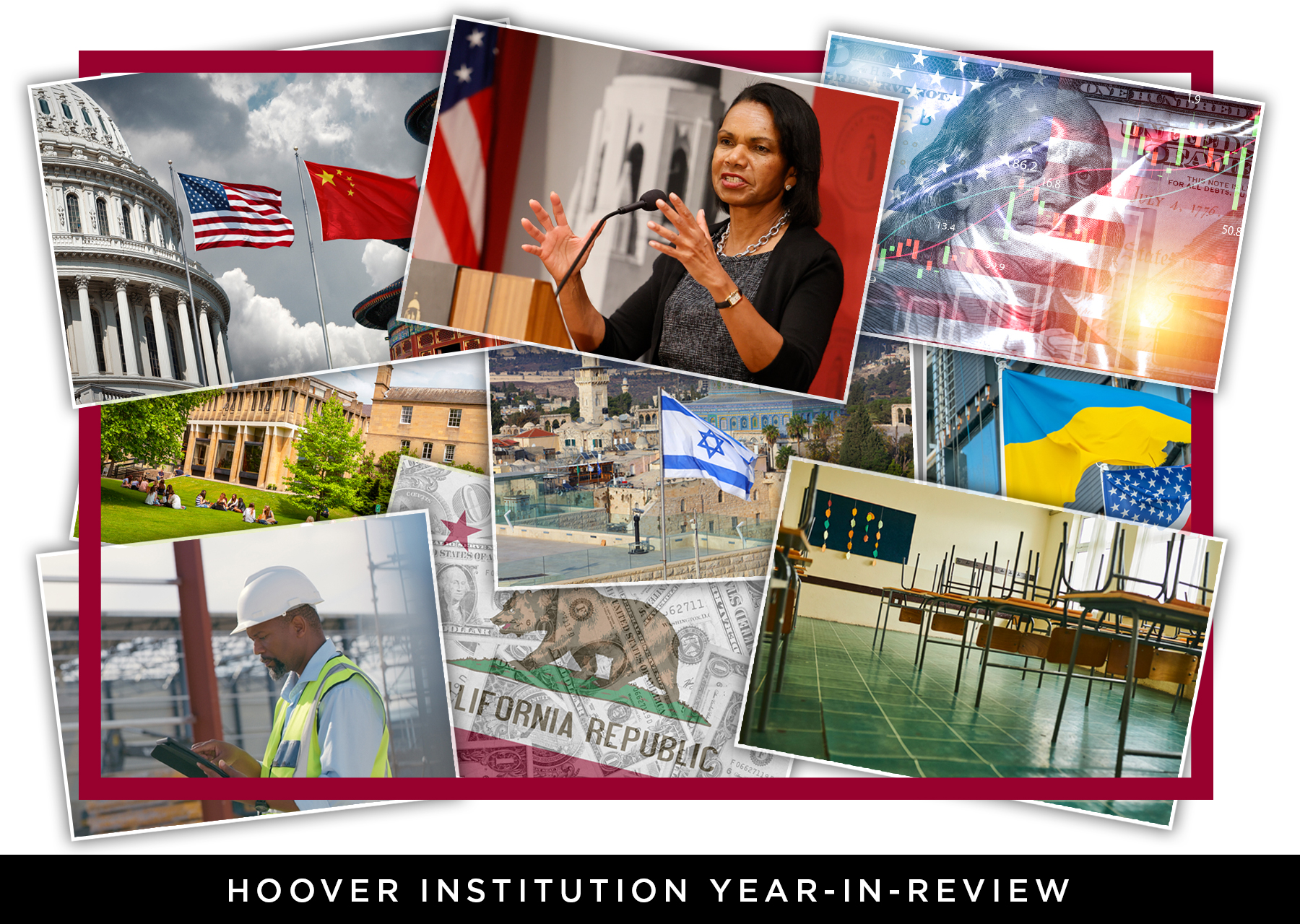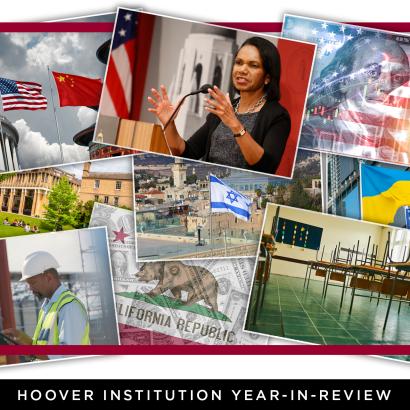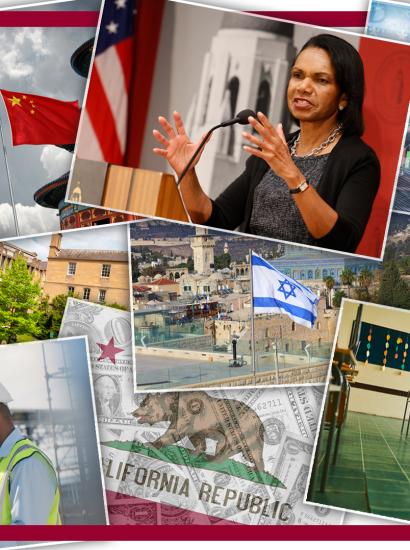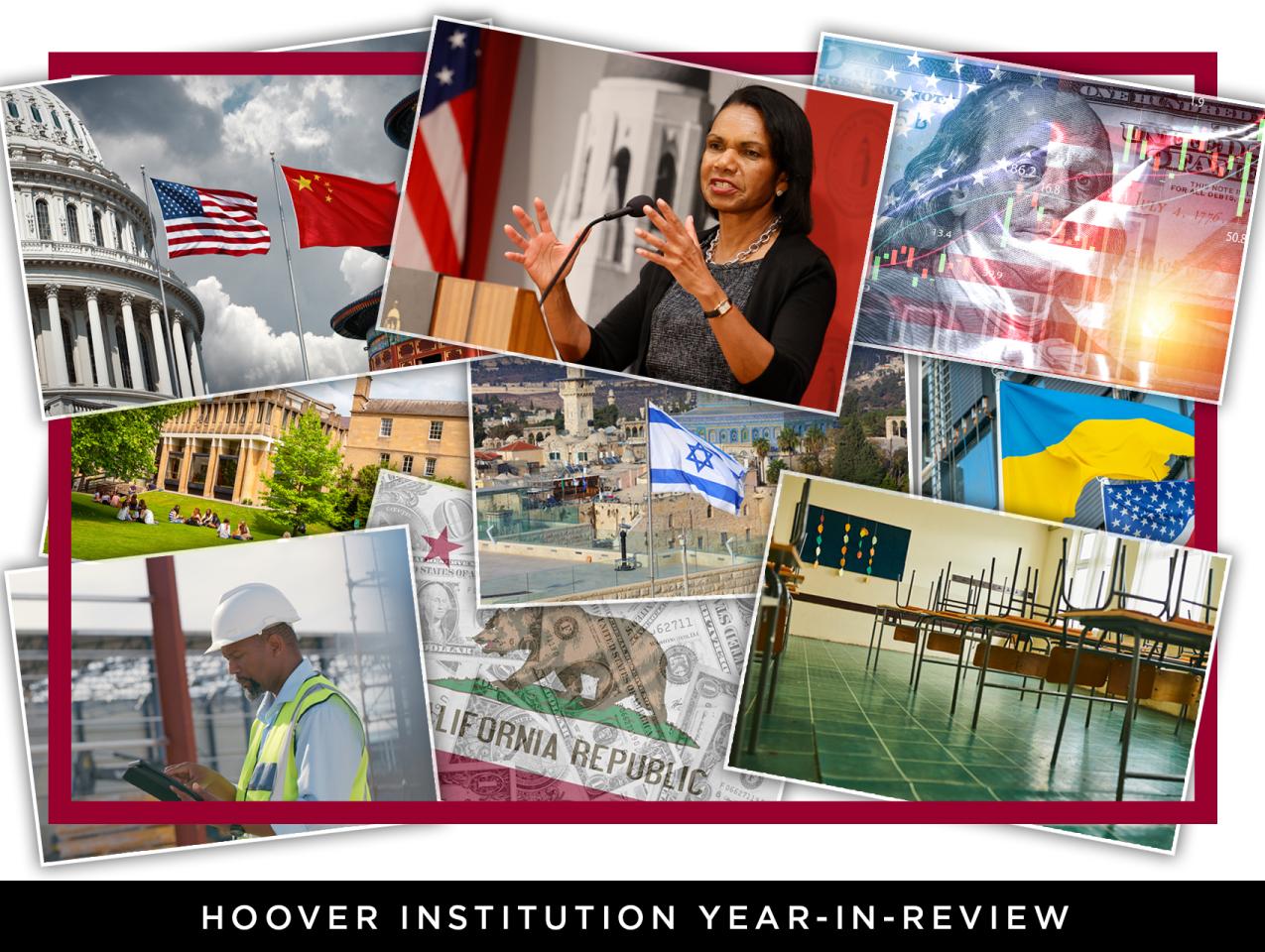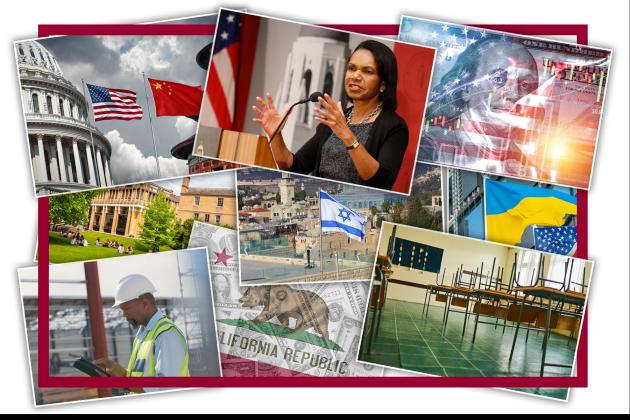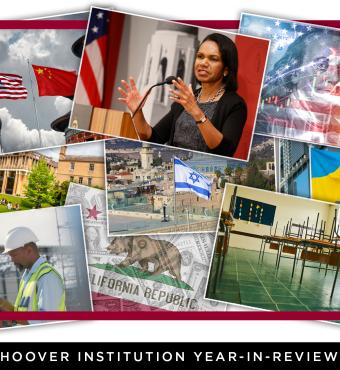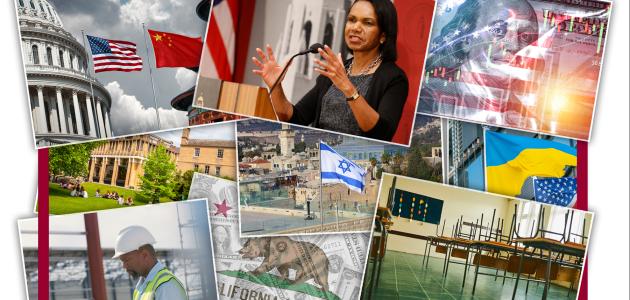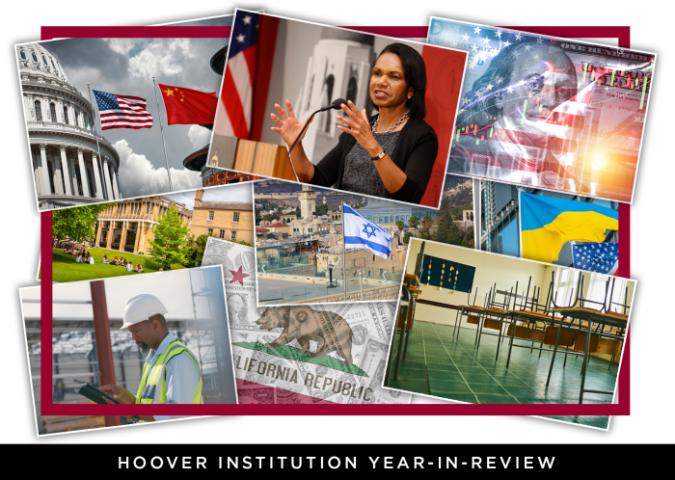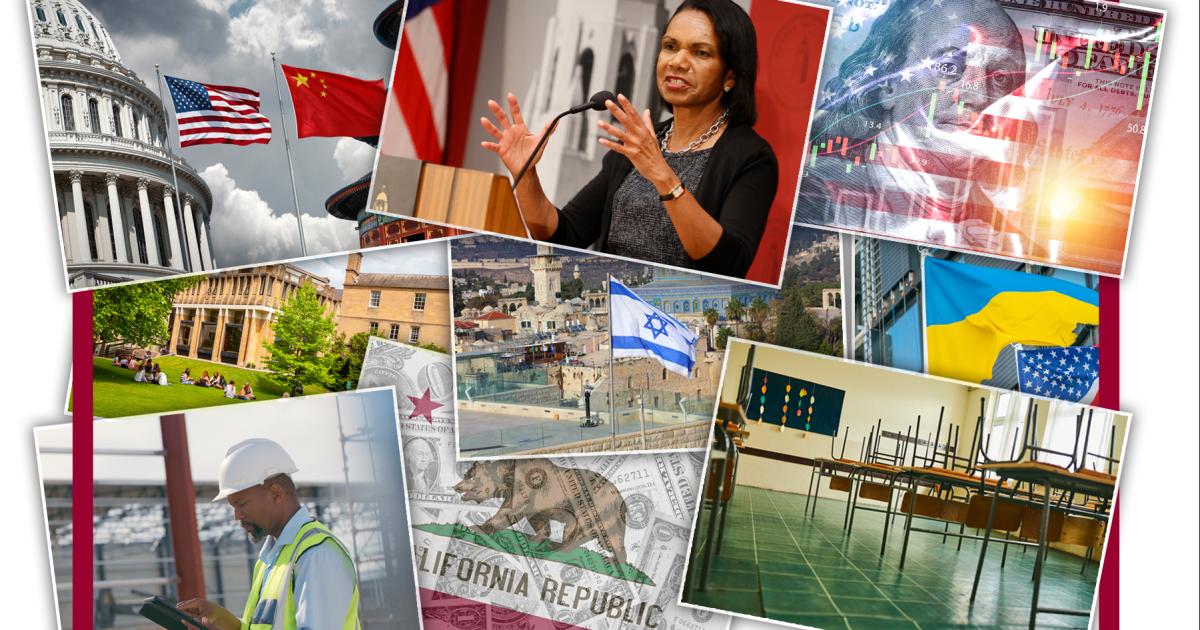The year 2023 again saw the world mired in various geopolitical crises.
In these challenging times, Hoover fellows offered thorough analyses on a wide variety of trends, uncertainties, and emerging conflicts. These included conflict in the Middle East, the arrival of artificial intelligence to the forefront of public consciousness, China’s saber rattling on Taiwan, Russia’s continued war against Ukraine, and issues closer to home such as sustained learning loss in America’s schools, continued budget volatility in certain US jurisdictions, historic rates of inflation, and a polarized electorate.
Below is a compendium of analysis by Hoover scholars sorted according to the Institution’s research priorities:
Answering Challenges to Advanced Economies
- In his new tome, The Fiscal Theory of the Price Level, John Cochrane, Rose-Marie and Jack Anderson Senior Fellow, argues that the root of inflation is when overall government debt is larger than people believe the government can or will repay.
- Watch Cochrane discuss the book on an episode of Uncommon Knowledge with Peter Robinson.
- Senior Fellow Amit Seru and colleagues analyze to what extent US banks hedged their asset exposure as monetary policy tightened in 2022.
- In a Hoover Institution Q&A, Seru describes the factors that led to the collapse of Silicon Valley Bank.
- Stephen Haber, Peter and Helen Bing Senior Fellow, explains that the collapse of the claim that abundance of resource wealth—particularly crude oil—creates and perpetuates authoritarianism is instructive to scholars as they advance and test other theories about the global distribution of forms of government.
- Steven J. Davis, Thomas W. and Susan B. Ford Senior Fellow, and colleagues describe their research on the evolution of work-from-home arrangements.
- In September, Davis chaired a conference about the implications of remote work.
- Click here to listen to Economics, Applied, a Hoover Institution podcast hosted by Davis.
- John F. Cogan, Leonard and Shirley Ely Senior Fellow, and Policy Fellow Daniel Heil chart rising incomes among senior citizens. They find seniors’ incomes are growing, largely due to investment returns and the fact that a sizeable number of them remain in the labor force.
- Read a Q&A about their research.
- Daniel Kessler, the Keith and Jan Hurlbut Senior Fellow, and colleagues examine the effect of MD organizational reform on the prescription of opioids.
- Jendayi Frazer, Duignan Distinguished Visiting Fellow, and Peter Blair Henry, Class of 1984 Senior Fellow, argue in Foreign Affairs that many African states need to foster private-public partnerships and acquire better data to fill an infrastructure gap that will only get wider as they experience a “demographic explosion.”
Determining America’s Role in the World
- In Fouad and Michelle Ajami Senior Fellow H.R. McMaster’s Battlegrounds, the former national security adviser spoke with senior officials in governments around the world, including Sweden’s defense minister Päl Jonson, Liberian presidential candidate Clarence Moniba, and former Afghan National Army special forces chief Gen. Sami Sadat.
- Articles by National Security Visiting Fellow Nadia Schadlow appeared in The Atlantic and the Wall Street Journal, writing about why accounting for time is valuable when engaging in strategic thought and how only America can restore world order.
- Senior Fellow Russell Berman writes in The Caravan about the troubling support for Hamas barbarism expressed by some American academics after the October 7 attacks.
- In the wake of the October 7 attack on Israel by Hamas, Hoover Institution director Condoleezza Rice spoke about the scale of Hamas’s brutality and why the suggestion Iran doesn’t train and fund Hamas is fanciful.
- Michael McFaul, Peter and Helen Bing Senior Fellow, argues in Foreign Policy that continued support for Ukraine isn’t just the right thing to do, it advances US foreign policy and national security interests.
- Director Condoleezza Rice and Niall Ferguson, Milbank Family Senior Fellow, write in The Economist about what the Cold War can teach us about the new China-US rivalry.
Confronting and Competing with China
- The Hoover Institution joined with the Asia Society Center on US-China relations to produce the Silicon Triangle report. In it, experts tackle how to safeguard America’s semiconductor supply chain, as it is now heavily reliant on Taiwan.
- To explain the report upon its release, the Hoover Institution produced this short introduction video, a video series, and podcast interviews.
- In February, Senior Fellow H.R. McMaster and Distinguished Visiting Fellow Matt Pottinger testified before the US House Select Committee on China, created the previous month. McMaster underscored the stakes of US competition with China and Pottinger described how Chinese Communist leaders are masters at disguising their true intentions.
- At the Hoover 2023 Fall Retreat, Senior Fellow Elizabeth Economy participated in a live-taping of Uncommon Knowledge, discussing her recent book, The World According to China, and President Xi’s ambition to reclaim “Chinese centrality on the global stage.”
- The Hoover China’s Global Sharp Power Project released China’s Grand Strategy for Global Data Dominance, authored by Visiting Fellow Matthew Johnson, which details how China’s Communist Party is harvesting the world’s data for its own purposes while releasing little of its own information in return.
- The Sharp Power Project released The CCP Absorbs China’s Private Sector, a report also authored by Johnson about how the Chinese Communist Party steers and manipulates domestic firms into aiding its foreign policy and security objectives.
- Visiting scholar and economist Mickey Levy held a seminar in October called “China’s Mismanaged Economy at a Critical Crossroad,” building on his research and Wall Street Journal op-ed on the same topic.
Revitalizing History
- As part of the new Hoover History Lab, Kleinheinz Senior Fellow Stephen Kotkin’s Global Futures: History, Statecraft, Systems project uses geopolitical and economic history to help understand key drivers of historical change.
- Senior Fellow Niall Ferguson’s History Working Group seminars explored a variety of topics, including the chaotic presidential election of 1968, a history of the Port of Leningrad (now St. Petersburg, Russia), and how America declassifies sensitive files.
- The Military History in Contemporary Conflict Working Group, chaired by Victor Davis Hanson, Martin and Illie Anderson Senior Fellow, released six issues of Strategika, examining topics such as NATO enlargement, whether the tank is obsolete, and the Russian way of war.
- Watch videos adapted from Strategika articles about “NATO’s Enduring Value” and the “Russian Way of War” in Hoover’s Unarchived educational video series.
- Finally, Hanson chaired workshop, which outlines the historical relationship between Russia and Ukraine and the prospects for a peaceful settlement between those two countries.
Understanding the Effects of Technology on Governance
- Together with Stanford’s School of Engineering, the Hoover Institution debuted the Stanford Emerging Technology Review with an introductory video by Hoover director Condoleezza Rice and Stanford School of Engineering dean Jennifer Widom. The review aims to inform policymakers about the policy implications of frontier technologies, including cryptography, space exploration, biotechnology, and artificial intelligence.
- The Hoover Institution hosted its Tech Track 2 symposium with tech leaders, academics, and policymakers. The off-the-record event allowed attendees to foster greater ties while discussing urgent national security matters.
Revitalizing American Institutions
- The Center for Revitalizing American Institutions (RAI) held a conference at Hoover, which began with Maryland governor Wes Moore and New Hampshire governor Christopher Sununu speaking with Director Condoleezza Rice about how to govern in a polarized era.
- The second day of RAI’s conference included several panel discussions on enhancing trust in the executive branch, raising the tenor of civil discourse, fostering trust in America’s military, and instilling confidence in US elections.
- Read this Q&A with Brandice-Canes Wrone, the Maurice R. Greenberg Senior Fellow and director of RAI.
- In research published in June, Senior Fellow Justin Grimmer and colleague Eitan Hersh explain that voting reforms that purport to increase or decrease turnout have negligible effects on election outcomes.
- In January, Hoover hosted a conference called Legitimacy of Administrative Law, and later produced an essay series that examines the proper role of the administrative state within America’s constitutional order.
- Also in January, election officials from across the United States gathered at Hoover for the Conference on Election Integrity, which involved a debrief of the 2022 elections, evaluating issues experienced on the ground with polling places.
- Hoover Senior Fellow Josiah Ober coauthored The Civic Bargain: How Democracy Survives with Brook Manville of Babson College.
- Read this Q&A with Ober about the challenges democracy faces and how the study of ancient civilizations can help us overcome them.
Empowering State and Local Government
- Hoover’s State and Local Governance Initiative examine the fiscal challenges facing the city of Milwaukee, Wisconsin, and documented findings in a report shared with city leadership.
- Senior Fellow Joshua D. Rauh and research program manager Jillian Ludwig analyze the state of California’s 2023 budget, which swung from a $97.5 billion surplus to a $22.5 billion deficit. They find that the state’s heavy reliance on personal income tax receipts and capital gains from a small pool of high-income earners is to blame for the extreme revenue volatility.
- On Hoover’s California on Your Mind web channel, Senior Fellow Lee Ohanian and Bill Whalen, the Virginia Hobbs Carpenter Distinguished Visiting Fellow in Journalism, examine topics including California’s 900,000 missing jobs and the state’s intractable homelessness problem.
- Listen to analysis about the state of California with Ohanian and Whalen on Hoover’s Matters of Policy & Politics podcast.
- Research Fellow Oliver Geisecke and Seamus Duffy provide a data-driven analysis on how pension reform offers a viable tool for prudent economic policy.
Reforming K‒12 Education
- Eric Hanushek, the Paul and Jean Hanna Senior Fellow, published research showing the COVID-19 pandemic’s impact on learning among pupils in all fifty states, translating to a decline in income of between 2 and 9 percent through each student’s working life.
- Watch Hanushek explain how to reverse these declines.
- The Hoover Education Success Initiative (HESI) released A Nation at Risk +40, looking back at education reform in the forty years since the seminal report on education was released in 1983.
- Read this Q&A about the project by its coeditor Stephen Bowen, Distinguished Policy Fellow.
- Stanford’s Center for Research on Education Outcomes (CREDO) released its National Charter School Study III 2023, which finding average charter school students advanced their progress in reading by sixteen days and advanced by six days in math as compared to their average public school counterparts.
- Listen to an interview with CREDO’s director Macke Raymond, a Hoover distinguished research fellow, about the study on Matters of Policy & Politics.
- In an interview with Senior Fellow Terry Moe, Hoover Fellow Michael Hartney speaks about his book, How Policies Make Interest Groups: Governments, Unions and American Education, in February. Watch the talk here.
For more of the Hoover fellowship’s current research and analysis, please subscribe to the Hoover Daily Report.







